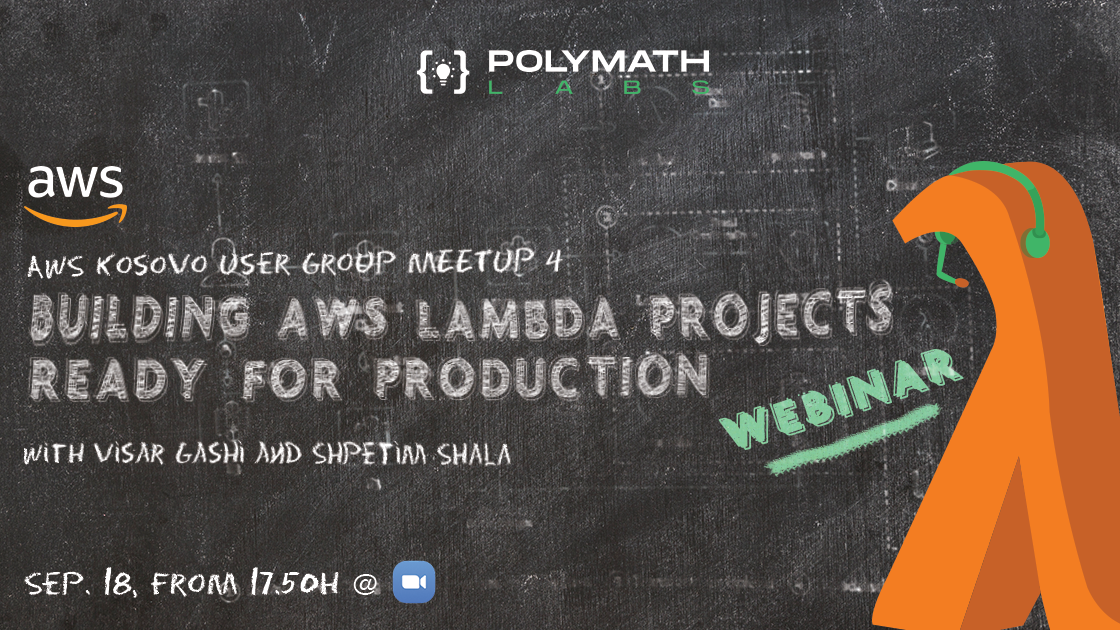
This remote edition of the Polymath Labs- Amazon Web Services User Group focused on AWS Lambda featured an introduction from CEO Visar Gashi and a hands-on lab component from our lead developer in Kosovo, Sheptim Shala.
The challenges related to gathering during a pandemic have not slowed the official Polymath Labs - Amazon Web Services (AWS) User Group in our effort to provide a sense of community and an opportunity for like-minded software engineers and information technology aficionados to absorb tricks of the trade from the professionals here at Polymath. This was our second webinar held in lieu of an in-person meetup and attracted a diverse group of technical people from around the world interested in digging into the topic of building AWS Lambda projects ready for production.
The presentation was two-fold, including both theoretical concepts and a practical component where participants were able to really look under the hood at how AWS Lambda projects function, going in-depth on serverless, codebuild, codepipeline, cloudformation and cognito. Polymath Labs CEO Visar Gashi kicked the evening off with an overview of the DevOps services we use that explained key concepts and best practices before handing the presentation off to our lead developer in Kosovo, Sheptim Shala, who provided a hands-on, end-to-end walkthrough of the full-stack web application process.
Visar’s introduction brought the group up to a full head of steam before the "learning by doing" hands-on demonstration of building production-ready AWS Lambda projects began, quickly walking the group through topics we have covered in previous Polymath Labs - AWS User Group meetups, including An Introduction Cloud-Native Architectures and Introduction to DevOps. The information presented in those meetups provides a great foundation for understanding what benefits AWS Lambda brings to the table for all kinds of businesses and startups in particular.
AWS Lambda is a serverless cloud computing platform that leverages the on-demand nature of serverless architecture to save time and money. What do we mean by "the on-demand nature of serverless?" Well, unlike non-serverless where you have to have an application server running somewhere around the clock waiting for requests to fulfill, Lambda is an on-demand service, meaning you simply deploy your code and there’s no server to configure. That code is not loaded until it is requested. Once it is deployed, the AWS infrastructure responds very quickly, loading it in memory on-demand so you only pay for the time that you actually used instead of also paying for a server to sit around doing nothing as it waits for you to deploy code. AWS Lambda is particularly useful for startups due to scalability and the fact that it is free up to 1,000,000 requests per month, which means that most applications will pay nothing. After the initial instance of code deployment, the information is cached and subsequent queries are extremely fast and scale with ease. In most use cases, that initial warmup time is inconsequential, particularly when pitted against the fact that you literally just write business logic and everything else is handled by Amazon quickly, reliably, and for very cheap (free is hard to beat, after all).
The second part of this virtual meetup was an exciting step for us as this was just the first in a broader lab series focusing on the capabilities of AWS in the serverless space. Dozens of intrepid, curious minds scattered around the world followed along with each step Sheptim demonstrated for them, learning how to build a truly production-ready app using AWS Lambda. The single-page React application (front end) with a serverless backend included Enterprise-ready continuous integration (CI) and continuous deployment (CD) infrastructure with complete infrastructure-as-code (IAS) configuration as well as serverless and managed service backend using a MongoDB compatible database, which is the managed database service offered by AWS. Not only did participants gain knowledge of the process during this hands-on lab, but they were introduced to an extremely useful tool that our Polymath developers have contributed to. On the Polymath Labs GitHub repository, we have put together an ever-expanding library of open-source developer tools, including a bootstrap project to help accelerate going live into production with React, Node, and DocumentDB.
As is typical at our meetups, the demo was followed by a question-and-answer session during which our participants were able to clarify points that were giving them trouble and connect for a bit with their peers from the global information technology community. This was just the beginning of our expansive training series on getting the most out of the Amazon Web Services offerings, so if you want to join the fun and learn a lot, get free AWS and GitHub accounts, and join the Polymath Labs - AWS Official User Group Kosovo (even if you don’t live in Kosovo) and get ready to become an AWS pro!


